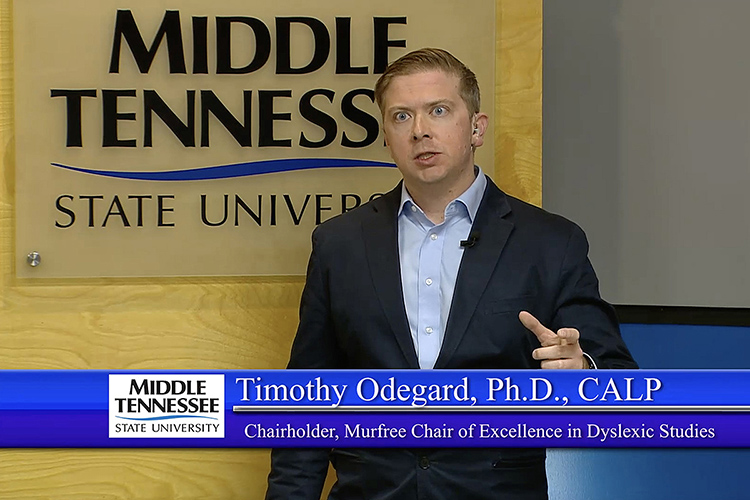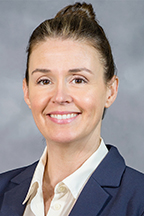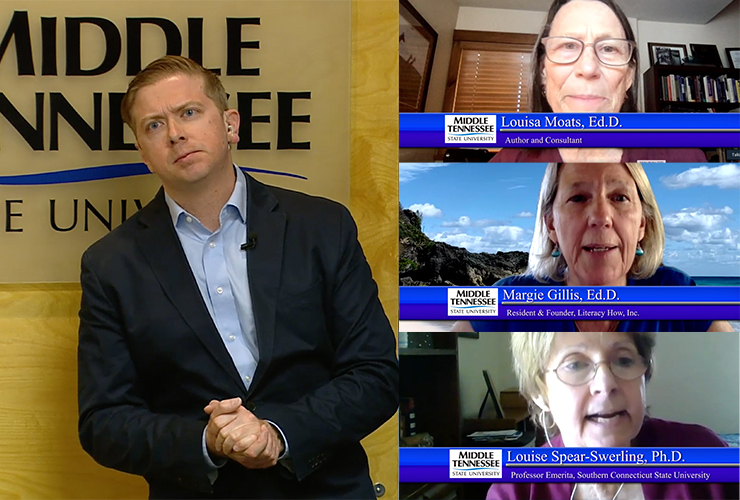MTSU recently attracted a worldwide audience with a conference that expected to attract about 400 people.
The Tennessee Center for the Study and Treatment of Dyslexia at MTSU transformed its Fox Reading Conference from a hybrid of in-person and cyberspace communication to an all-digital endeavor because of the COVID-19 virus outbreak.

This computer screen capture shows Dr. Tim Odegard, who holds the Katherine Davis Murfree Chair of Excellence in Dyslexic Studies at MTSU, moderating the March 21 Fox Reading Conference hosted by the Tennessee Center for the Study and Treatment of Dyslexia at MTSU via videoconferencing. (Image courtesy of MTSU Livestream)
Some 5,500 people on four continents logged in for all or part of the March 21 videoconferencing session, which had reached its on-campus registration capacity. Dyslexia Center staff facilitated the conference, which included online participation from its three main invited speakers.

Dr. Jennifer Flipse
“We were thrilled that we were able to convert it to an online conference,” said center director Dr. Jennifer Flipse.
Participants hailed from many nations, including Japan, India, China, Spain, United Arab Emirates, Italy, France, Portugal, Czech Republic, Vietnam, Poland and Bangladesh.

Dr. Tim Odegard
With Dr. Tim Odegard, who holds the Katherine Davis Murfree Chair of Excellence in Dyslexic Studies at MTSU, moderating the discussion, attendees exchanged information and perspectives on how to help students enhance their reading comprehension.
“The most rewarding part for me as the moderator was being able to use questions that we got from people on the chat as prompts,” Odegard said. “I engaged the presenters in a dialogue around some of these topics.
“The online audience responded very positively to watching me engage my friends in a conversation around issues that educators, parents and administrators deal with daily.”
 “All of our presenters highlighted evidence-based reading instruction,” Flipse said. “They drove home the elements that good reading instruction should contain and why each is so important.”
“All of our presenters highlighted evidence-based reading instruction,” Flipse said. “They drove home the elements that good reading instruction should contain and why each is so important.”
Among key presenters, shown in the illustration at top, were author and consultant Louisa Moats; Margie Gillis, resident and founder of Literacy How Inc.; and Louise Spear-Swerling, professor emerita at Southern Connecticut State University.
Flipse said the expert conference guests advocated a structured literacy approach to reading instruction rather than choosing an emphasis on either phonics or “whole language,” a method in which readers construct personal meaning using prior knowledge to help them interpret what they’re reading.
Structured literacy is “an approach to reading instruction where teachers carefully structure important literacy skills, concepts and the sequence of instruction to facilitate children’s literacy learning and progress as much as possible,” according to the International Dyslexia Association.
The Fox Reading Conference was made possible by the Tom and Elizabeth Fox Endowment for Reading. To view video of the entire day-long conference, go to https://livestream.com/mtsu/events/9013868 and advance the video 40 minutes to get to the start of the conference.
For more information about services provided by the Tennessee Center for the Study and Treatment of Dyslexia, contact Flipse at jennifer.flipse@mtsu.edu.
— Gina Logue (gina.logue@mtsu.edu)


COMMENTS ARE OFF THIS POST